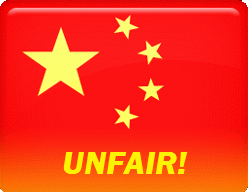Leveling the playing field for American workers
 In 2009, the Obama administration imposed harsh tariffs on tires imported from China. This move, called a “safeguard provision” is allowed under a 2000 law. China agreed to the provision when it negotiated its membership in the World Trade Organization (WTO). The provision allows such tariffs to be imposed when a surge in imports into the U.S. damages our industries.
In 2009, the Obama administration imposed harsh tariffs on tires imported from China. This move, called a “safeguard provision” is allowed under a 2000 law. China agreed to the provision when it negotiated its membership in the World Trade Organization (WTO). The provision allows such tariffs to be imposed when a surge in imports into the U.S. damages our industries.
China retaliated by placing antidumping and countervailing duties on imports of American-produced automobiles in 2011. This week, the U.S. government filed a challenge with WTO, saying these duties are based on phony allegations. From a statement from the Office of the U.S. Trade Representative Ron Kirk:
The United States believes that China initiated the investigations without sufficient evidence; failed to objectively examine the evidence; and made unsupported findings of injury to China’s domestic industry. In addition, China failed to disclose “essential facts” underlying its conclusions; failed to provide an adequate explanation of its conclusions; improperly used investigative procedures; and failed to require non-confidential summaries of Chinese company submissions.
The duties imposed by China affect over $3 billion in vehicle exports. The U.S. government is requesting dispute settlement consultations with China at the WTO.
Again, from Ambassador Kirk:
As we have made clear, the Obama Administration will continue to fight to ensure that China does not misuse its trade laws and violate its international trade commitments to block exports of American-made products. American auto workers and manufacturers deserve a level playing field and we are taking every step necessary to stand up for them. This is the third time that the Obama Administration has challenged China’s misuse of trade remedies.
The two previous government actions in this regard involved Chinese imports of certain steel and chicken products into the U.S. They also brought actions against China’s export restraints on several industrial raw materials, including rare earths, China’s restrictions on electronic payment services and subsidies to China’s wind power equipment sector.
According to Ambassador Kirk, “under WTO rules, if parties do not resolve a matter through consultations within 60 days, complainants may request the establishment of a WTO dispute settlement panel.”
Free trade requires fairness and a level playing field. China has repeatedly tried to tip the field in their own direction and these responses by the Obama administration are both appropriate and necessary.



